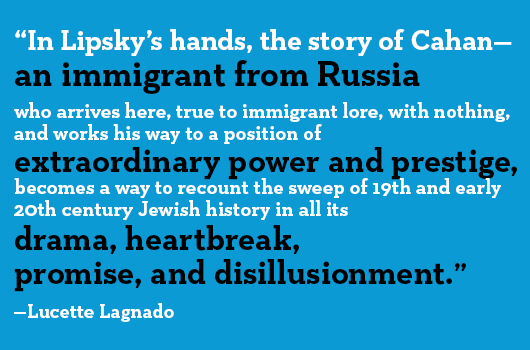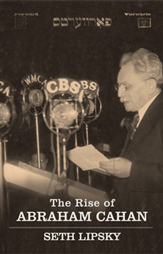Overview
"In Lipsky’s hands, the story of Cahan – an immigrant from Russia who arrives here, true to immigrant lore, with nothing, and works his way to a position of extraordinary power and prestige,becomes a way to recount the sweep of 19th and early 20th century Jewish history in all its drama, heartbreak, promise, and disillusionment."
—Lucette Lagnado, author of The Man in the Sharkskin Suit "Don't believe that there was a time not so long ago when a socialist daily newspaper in New York City -- published in Yiddish! -- commanded the attention not only of millions of Jewish immigrants but of presidents and foreign leaders? Read this magical book. It will transport you back to some of the most tumultuous decades the world has ever known, as seen through the life of a fearless newspaperman whose paper didn't simply cover events; it changed the course of them." —Jonathan Mahler, author of Ladies and Gentlemen, the Bronx is Burning "Seth Lipsky has written an extraordinary book about an extraordinary man. Abraham Cahan is a pivotal figure in both Jewish history and the history of American journalism, and Lipsky has done a superlative job of capturing his magnetism, his complexity and his contradictions. Reading this book made me wish I could transport myself back in time, to the pressrooms and tenements and thunderous political rallies of the Lower East Side a hundred years ago. Lipsky has a Doctorow-like ability to bring to life the tumult, joy and tragedy of life in the big city. He is also the best person alive to write the definitive biography of Cahan, because he is widely understood to be Cahan's worthiest successor." —Jeff Goldberg, national correspondent of the Atlantic and columnist for Bloomberg View This is an indispensible book: a wonderfully intelligent reckoning with a wonderfully intelligent man. Lipsky, a great newspaperman himself, brings Cahan vividly alive, not only as a witness to the spectacularly rich, dramatic, and consequential history of the first half of the twentieth century - but as a defining actor in that history. Lipsky’s portrait of the mighty Yiddish editor – at once admiring and critical – is lit by the fiery political and cultural debates that blazed in the pages he published, as the Jewish experience was reshaped by and did so much to reshape the modern world. —Philip Gourevitch The first general-interest biography of the legendary editor of the Forward, the newspaper of Yiddish-speaking immigrants that inspired, educated, and entertained millions of readers; helped redefine journalism during its golden age; and transformed American culture. Already a noted journalist writing for both English-language and Yiddish newspapers, Abraham Cahan founded the Yiddish socialist daily in New York City in 1897. Over the next fifty years he turned it into a national newspaper that changed American politics and earned him the adulation of millions of Jewish immigrants and the friendship of the greatest newspapermen of his day, from Lincoln Steffens to H. L. Mencken. Cahan did more than cover the news. He led revolutionary reforms--spreading social democracy, organizing labor unions, battling communism, and assimilating immigrant Jews into American society, most notably via his groundbreaking advice column, "A Bintel Brief." Cahan was also a celebrated novelist whose works are read and studied to this day as brilliant examples of fiction that turned the immigrant narrative into an art form. Acclaimed journalist Seth Lipsky gives us the fascinating story of a man of profound contradictions: an avowed socialist who wrote fiction with transcendent sympathy for a wealthy manufacturer; an internationalist who turned against the anti-Zionism of the left; an assimilationist whose final battle was against religious apostasy. Lipsky's Cahan is a prism through which to understand the paradoxes and transformations of the American Jewish experience. A towering newspaperman in the manner of Horace Greeley and Joseph Pulitzer, Abraham Cahan revolutionized our idea of what newspapers could accomplish. With 16 pages of black-and-white illustrations.Reader's Guide
It’s impossible to talk about Jewish immigrants in America without talking about Abraham Cahan. Not only did Cahan author one of the seminal novels about Jewish life in America in the early 20th century—The Rise of David Levinsky—but he also helped create the Forward, the immigrants’ Yiddish-language newspaper that he edited for some five decades. In The Rise of Abraham Cahan, Seth Lipsky, the founding editor in 1990 of the English-language Forward, examines the life and career of the man who for generations helped Jews understand America—and vice versa.
PERSONAL LIFE Cahan was born in a small Lithuanian village in 1860—during the reign of Czar Alexander II—and grew up in Vilna, a major center of Jewish intellectual and religious thinking. After Alexander was assassinated in 1881, the situation for Jews in his homeland deteriorated quickly, and in 1882, he left behind his parents and his younger brother to immigrate to America. •After Cahan immigrated to the U.S., he failed to stay in good contact with his parents, and saw them only one more time: on a visit to Vienna in 1893. Why do you think he didn’t stay in closer contact? Why do you think he never brought them to America to join him and his younger brother Isaac, who immigrated in 1892? Do you think this distance from his family had an impact on his career? •When Cahan was growing up, Vilna was a center of Haskala, Jewish enlightenment, and the culture wars between religious and secular Jews. Cahan fell into the secular camp. And yet, as someone who had grown up in a religious home, he never fully rejected religion. Lipsky writes: “For all his worldly and political success, for all his freethinking and socialist idealism, he was never able to escape thinking of himself as a young yeshiva student from Vilna who prized, above all else, the wonder of Jewish life.” In what ways were Cahan’s political views shaped by his upbringing in a religious home? •How did the anti-Semitism and pogroms Cahan witnessed in his early years affect how much he identified with the Jewish community in his later years? What impact did such anti-Semitism have on the cohesiveness of the Jewish community—in Europe, and later, in America? Did Cahan’s strong sense of Jewish identification bring him into conflict with other socialists? How did he resolve this tension? •Cahan had an impressive facility with language. He was fluent in Yiddish, Hebrew, Russian, and English—the latter of which he picked up in a matter of months after arriving in New York. What did each of these languages symbolize to Cahan? Did he use different languages for different purposes, or to reach different audiences? How did his facility with languages affect his writing, and inform his politics? JOURNALISM Just months after launching the Forward in 1897, Cahan quit the paper. He returned five years later, but again quit within months. The third time was the charm, though, and he remained at the newspaper for most of the rest of his life, so that the history of the Forward and Cahan’s own legacy are deeply intertwined and often indistinguishable. The newspaper he built, the first newspaper published nationally, with a daily circulation reaching a quarter million copies, would ultimately help define Jewish life in America in terms of language, culture, politics, and literature. •Although he is most closely associated with the Forward, Cahan worked elsewhere during his career: He wrote for other Russian, Yiddish, and English-language newspapers before the Forward launched, and spent five years at the Commercial Advertiser after launching and quickly leaving the Forward in 1897. How did these other publications influence what Cahan would eventually achieve at the Forward? •When Cahan returned to the Forward briefly in 1902, he made major changes to the paper. Most notably, he changed the paper’s linguistic style, shifting from a dry, highbrow Yiddish to what he called “pure, plain, Yiddishe Yiddish.” At the same time, Lipsky writes, Cahan oversaw a “slight softening of the Forward’s fervently antireligious stance.” Why did Cahan make these changes, and what effect did he hope they would have? Was he successful? What kind of resistance did he face, and why? •In 1906, after he returned to the Forward again, Cahan introduced what would become the newspaper’s most famous and enduring feature: the Bintel Brief advice column. In the Bintel Brief, immigrants sent in letters asking questions and presenting ethical quandaries about life in America—about everything from fashion to romance to business. Soon after its
News and Reviews
The Rise of Abraham Cahan recounts 19th and early 20th century Jewish history “in all its drama, heartbreak, promise, and disillusionment.”
"In Lipsky’s hands, the story of Cahan – an immigrant from Russia who arrives here, true to immigrant lore, with nothing, and works his way to a position of extraordinary power and prestige, becomes a way to recount the sweep of 19th and early 20th century Jewish history in all its drama, heartbreak, promise, and disillusionment." Continue reading
Seth Lipsky Takes on Abraham Cahan in New Biography
“He really was one of the great progenitors of modern journalism and a newspaper editor in the way they’re supposed to be, as historical actors,” Mr. Lipsky said. “They’re players on the world stage, and newspapers are their instrument.” Continue reading
The Education of Abraham Cahan (and Seth Lipsky): Forward Editor Blended Universal and Jewish Values
"As Seth Lipsky details in his short and engaging new biography, “The Rise of Abraham Cahan,” the contest between universal values and Jewish interests was a struggle throughout his life." Continue reading
Seth Lipsky’s Cahan a “lively” biography
Seth Lipsky, founding editor of the English-language "Forward," pens a lively, concise biography of Yiddish "Jewish Daily Forward" founder Abraham Cahan. Continue reading
The Education of Abraham Cahan (and Seth Lipsky)
"All this made the Forverts wildly successful and earned Cahan, as Lipsky argues, “a place in the pantheon of America’s greatest newspaper editors.” Continue reading
Moving It Forward: The Life of Abraham Cahan Considered
"Abraham Cahan, an overlooked legend in 20th century American journalism, finally gets his due in a new biography by Seth Lipsky. He recounts his editorship of the Forward and his political twists and turns." Continue reading
Seth Lipsky, The Rise of Abraham Cahan
"Figure bien oubliée aujourd’hui - injustement d’ailleurs -, Abraham (“Abe”) Cahan fut une des personnalités les plus marquantes de la vie new-yorkaise pendant plus d’un demi-siècle." Continue reading
About the Author
Seth Lipsky
SETH LIPSKY is the founding editor of the English-language Forward and of The New York Sun. He is a former foreign editor of The Wall Street Journal and served as a member of its editorial board. He is the author … Continue reading



